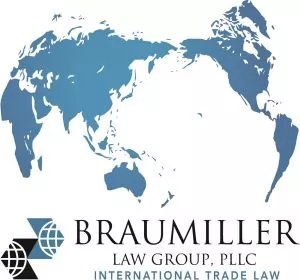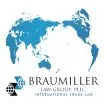- within International Law topic(s)
- in European Union
- in European Union
- in European Union
- with readers working within the Retail & Leisure industries
- within Corporate/Commercial Law, Energy and Natural Resources and Technology topic(s)
Trade Wars & Sanctions – The New Trade Order
A Q&A with Adrienne Braumiller, Founder & Managing Partner, and Olivia Van Pelt, Braumiller Law Clerk
Question 1: How are you advising businesses in your jurisdiction when protecting themselves from the impact of trade wars and sanctions, and what strategies can professional services firms offer to mitigate these risks?
Only months into President Trump's second administration and the new tariff regime has already changed the international trade world dramatically. These tariffs have and will continue to significantly impact business' profitability and operational efficiency. Fortunately, businesses can implement proactive strategies and seek guidance from experts to minimize the impact.
Rare Earth Minerals, and China's Global Dominance
By Bob Brewer, Braumiller Law Group
If I heard it once, I've heard it a thousand times, China is the sourcing capital of the world. I've also repeated this statement at least 400+ times in many conversations over the years regarding global trade. China, it's also where the global market goes for rare earth minerals, among thousands of other necessary elements for a veritable plethora of life's essential things. By the end of 2024, China produced more than two-thirds (approximately 70%) of the world's rare earth minerals. Additionally, China controls over 80% of the global processing capacity for these minerals, which is a critical part of the global supply chain.
The Tokenization Rulebook: Compliance Strategies for the Digital Asset Revolution
By James R. Holbein, Of Counsel, and Justin Holbein, CEO, Web3 Consulting LLC
Introduction: The Evolution of Real-World Asset Tokenization
Since Bitcoin's creation in 2008, cryptocurrencies and traditional assets have largely existed in parallel. In our previous exploration of Real World Assets (RWAs) (Assessing the Benefits and Challenges of Tokenizing Real World Assets, February 7, 2024), we identified how the lack of reliable bridges between on-chain and off-chain ecosystems has constrained the transformative potential of blockchain technology.
Section 232 Investigation of Commercial Aircraft, Jet Engines and Parts
By Bruce Leeds, Senior Counsel, Braumiller Law Group
In a recent Federal Register notice the Bureau of Industry & Security (BIS) of the Department of Commerce announced that "On May 1, 2025, the Secretary of Commerce initiated an investigation to determine the effects on the national security of imports of commercial aircraft and jet engines, and parts for commercial aircraft and jet engines. This investigation has been initiated under section 232 of the Trade Expansion Act of 1962, as amended (Section 232)." The investigation may take up to 270 days but it can be concluded sooner.
U.S. vs China as a Global Trade Partner, Are We (U.S.) the Bad Guys?
By Victoria Holmes, Braumiller Law Group
A quiet but significant power shift has been unfolding across Latin America. While the United States has long been the dominant economic and political influence in the region, its recent inward turn under the "America First" doctrine has created openings that China is eager to fill. Through infrastructure investments, trade agreements, and strategic diplomacy, Beijing is steadily gaining ground. The result is a hemisphere that increasingly looks to China—not Washington—as a key partner. How worried should we be about this shift in power? This realignment is more gradual and complex than it might initially seem and could be pivoted in different directions following Trump's second administration.
Tariffs Legal Decisions Under IEEPA Raise Constitutional Issues for Circuit Courts
By James R. Holbein, Of Counsel, Braumiller Law Group PLLC
Several lawsuits challenging the legal validity of the tariff actions taken by President Trump since he took office on January 20, 2025, are in process of moving through the federal courts. They raise a variety of important jurisdictional and constitutional questions and seem poised to lead to challenges in federal circuit courts and the Supreme Court.
CIT Decisions Finding IEEPA Tariffs Unconstitutional
A three judge panel of the Court of International Trade (CIT) has ruled in two cases recently (VOS Selections, Inc. v. Trump and the State of Oregon v. Trump) that the Presidential actions taken under the International Emergency Economic Powers Act (IEEPA) (50 U.S.C. §§ 1701–1707) to impose tariffs on Canada, Mexico and China for illegal immigration and fentanyl smuggling are unconstitutional. The judges reasoned that the tariff actions taken do not deal with the emergency upon which the actions were based and were not delegated by Congress to the Executive Branch by that statute and therefore exceed the President's tariff setting authority under the Constitution.
Trump's Plan B for Tariffs
By Olivia Van Pelt, Law Clerk, BLG
On May 28, 2025, the United States' Court of International Trade (CIT) struck down the President's use of the International Economic Emergency Powers Act (IEEPA) to impose tariffs. (1) This includes tariffs imposed on Canada, China, and Mexico in response to the fentanyl crisis at U.S.' borders and reciprocal tariffs imposed on almost all foreign imports on April 2, 2025. The Government immediately appealed the decision to the U.S. Court of Appeals for the Federal Circuit (CAFC).
(1) https://www.cit.uscourts.gov/content/slip-opinions-2025
Tariffs and the Future of U.S. Beef
By Brandon French, Senior Associate Attorney, and Olivia Van Pelt, Law Clerk, BLG
On April 2, 2025, President Trump announced reciprocal tariffs, setting a baseline rate of 10% on imports from all countries, with higher rates on dozens of countries which the United States (U.S.) runs trade deficits.(1) Specifically, Trump imposed a 34% tariff on all Chinese imports in response to China's 67% tariff and non-tariff barriers on U.S. exports, aiming to address what he sees as an unfair trade imbalance.
U.S.-China Trade Relations: An Update on Tariffs
By Brandon French, Senior Associate Attorney, and Olivia Van Pelt, Law Clerk, BLG
Since Trump's first term, tensions between the United States and China, the world's two largest economies, have been on the rise. President Trump ran for his second presidential term on a promise to reduce reliance on China – and promise kept. In one of his first Presidential actions, President Trump issued an "America First Trade Policy" memorandum dedicating an entire section to trade relations with China. (1) Since then, several tariffs have been imposed on Chinese goods and the duty-free de minimis treatment for goods valued at $800 or less ended. In April, the tension reached its peak, as escalating tariffs on both sides brought the two nations to the brink of a full-scale trade war.
CTPAT: An Anchor for Weathering the Trade Storms
By Judy Davis, Senior Trade Advisor, Braumiller Consulting Group
A few weeks ago, at the Trade and Cargo Security Summit, held in New Orleans, we learned that CBP (Customs and Border Protection) WAS NOT going to discuss the current administration's policy during the conference. (Cue the dramatic music). Will you feel better if I tell you the groan across the audience was conspicuously audible? No? Well, I tried. So, let me take a different approach and tell you about the positive emphasis on utilizing the tools available that can help trading partners prepare for uncertainty and instability, including CTPAT membership. Leveraging your participation in the CTPAT program provides a strategic advantage in navigating changes in trade policies, allowing your company to quickly respond to new challenges.
The Art of the (UK) Deal
By Olivia Van Pelt, Law Clerk, and Paul Fudacz, Partner, BLG
On May 8, 2025, the United States and United Kingdom (UK) unveiled the new trade terms of an "economic prosperity" deal. (1) This deal comes after President Trump imposed a 10% reciprocal tariff on all products from the UK and additional tariffs on steel and aluminum, and automobiles and automobile parts. While the 10% reciprocal tariff will remain in effect, the two countries were able to agree on alternative arrangements for steel and aluminum, automobiles, and other strategic sectors.
Protectionism or Free Trade?
By Mike Smiszek, Senior Trade Advisor, Braumiller Consulting Group
The Realities of Free Trade
Many of our basic freedoms are guaranteed by the Constitution. Speech, press, assembly, religion: these are all accepted as sacrosanct rights by reasonable people across the political spectrum. But should we not have the same freedom when it comes to the economy?
In view of today's divisive tariff debate, I want to explore economic freedom in as nonpartisan a tone as possible by looking at the two diametrically opposed schools of trade-related economic thought: free trade and its arch nemesis, protectionism. And to help us understand the relationship between free trade and protectionism I will also examine two closely related and time-tested economic principles, comparative advantage and the division of labor.
UPCOMING EVENTS
Join Braumiller Law Group Senior Counsel Bruce Leeds
for the next presentation in a monthly series regarding
Hot Topics in International Trade Compliance
Avoiding the Special Tariffs
by Use of Chapter 98,
Well....Maybe
Thursday, June 19th, – 11:30-12:30 CST
More information: https://conta.cc/3Sml5W8
MIC-Braumiller-ICPA Mexico Summit November 5th-6th
Mexico City Sheraton
Info: Home - MEXICO SEMINAR: Navigating the Trade
Landscape (Challenges & Opportunities Between Mexico & the
US)
Look for us monthly throughout 2025 in the Tuesday Trade Talks with ICPA
If you are so inclined and have a moment, or two, or ten, check out our podcasts and videos regarding all things in International Trade Compliance
Podcasts: BLG Podcast - Braumiller Law Group
Videos: Videos - Braumiller Law Group
Check out our new Digital Magazine Get the inside scoop on the Braumiller Law Group & Braumiller Consulting Group "peeps." Expertise in International Trade Compliance.
The content of this article is intended to provide a general guide to the subject matter. Specialist advice should be sought about your specific circumstances.


